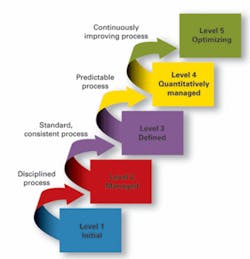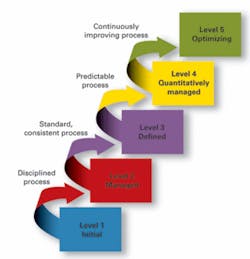Carnegie Mellon’s capability maturity model
The Carnegie Mellon Software Engineering Institute’s Capability Maturity Model (CMM) describes organizational maturity as “continuous process improvement based on many, small evolutionary steps rather than revolutionary innovations.” Evolutionary steps are arranged in five maturity levels.
Level 1. The software process is characterized as ad hoc, occasionally even chaotic. Few processes are defined, and success depends on individual effort rather than organizational competence.
Level 2. Basic project management processes are established to track cost, schedule, and functionality. Process discipline is in place to ensure repeatability.
Level 3. The software process for both management and engineering is documented, standardized, and integrated with the organizational software process. All projects use an approved version of the organizational standard process to develop and maintain software.
Level 4. Detailed quantitative measurements of the software process and product quality are collected, understood, and controlled.
Level 5. Continuous process improvement is enabled by quantitative feedback from the process and from piloting innovative ideas and technologies.

